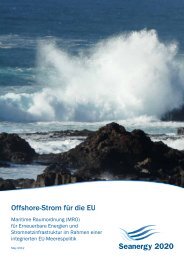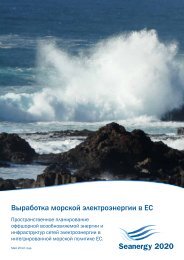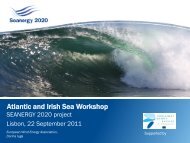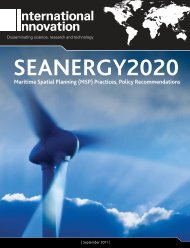Comparative analysis of Maritime Spatial Planning ... - Seanergy 2020
Comparative analysis of Maritime Spatial Planning ... - Seanergy 2020
Comparative analysis of Maritime Spatial Planning ... - Seanergy 2020
Create successful ePaper yourself
Turn your PDF publications into a flip-book with our unique Google optimized e-Paper software.
simplifies the permitting and licensing process for the ORE developer and provides, in general, betterguarantees for a coordinated <strong>analysis</strong> and assessment <strong>of</strong> applications for ORE development.In Greece, the Renewables Act <strong>of</strong> 2010 provides the legal basis for permitting and licensingprocedures, and an international tender procedure will be launched after the results <strong>of</strong> the SEAprocedure are published. As mentioned before, the outcome <strong>of</strong> the SEA may alter the conditions inthe specific Greek maritime zones, or even withdraw some, so at this stage it is too early to evaluatethe results <strong>of</strong> the permitting and licensing practice in Greece.Legally binding ORE zoning instruments, such as the SEA process in Spain (2009) have recentlyestablished a certain regulatory certainty. Nevertheless, it is still too early to assess the effectiveness<strong>of</strong> these MSP instruments in terms <strong>of</strong> promoting investment in ORE.3.2.3 Policy recommendations• Reduce the number <strong>of</strong> required licenses and permits for ORE development to a scatteredlicensing regime where one administration can authorise a project which can be undone byanother ministry,• Establish - where possible - the one single procedure for the authorisation and operation <strong>of</strong><strong>of</strong>fshore renewable energy projects, likely to guarantee the best possible coordination <strong>of</strong> allconcerned administrations, at cross-sectorial level as well as at national, regional and local level,• Based on the licensing process practices <strong>of</strong> the Mediterranean Sea basin, coordination <strong>of</strong> the„one-stop-shop‟ licensing process should be assigned to the Energy administration <strong>of</strong> the coastalstates. In general, the Energy administration is well aware <strong>of</strong> the need and the urgency to deliverthe 20/20/20 energy target (ORE deployment can contribute substantially to this target, asillustrated below) 35 . The Energy administration will also be able to integrate from the outset thegrid connection element into the general licensing process. The Energy administration seems tobe, in general 36 , the most appropriate administration to push the ORE development througheffective and streamlined permitting and licensing. Taking into account the lack <strong>of</strong> development<strong>of</strong> ORE in the Mediterranean so far, it is important that the most ambitious administration interms <strong>of</strong> ORE development takes the lead in the licensing process.• Develop a criterion based MSP in their territorial seas such as in UK which appears to be the bestsolution for the Mediterranean Sea, or alternatively use the example <strong>of</strong> Greece and Spain todelimitate ORE zones,• Early and active stakeholder consultation in the licensing process will result in a broader supportfor ORE development in the territorial seas, which may reduce significantly the risk <strong>of</strong>administrative or juridical appeals against granted permits or licenses.35 Belgian case study: 6,6 % <strong>of</strong> maritime zon can generate 10 % <strong>of</strong> gross national electricty production. Seechapter North Sea.36 This may not automatically be the case in countries with low ORE ambitions.Deliverable D 2.372 | P a g e






